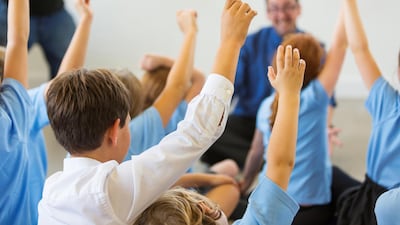British boarding schools will aim to return to normal after the Easter break but a summer term with no exams will focus on the well-being and mental health of pupils after months of remote learning, a head teacher said.
About 70,000 pupils attend private boarding schools in the UK, 40 per cent of whom are overseas students with parents living abroad, the National Education Union said.
Pupils from red-list countries can quarantine for 10 days in their school accommodation, rather than at a government-arranged hotel, if they are allowed to enter the UK.
Only British and Irish citizens and people with residence rights in the UK are allowed to enter England from those countries.
Some pupils have been living in “boarding bubbles” during the pandemic, but other dormitory beds were empty for much of the spring term.
Rebecca Tear, the head of Badminton School in Bristol, said schools would look to provide new “communal experiences” and develop children’s life skills in the summer term after two prolonged periods of closure.
UK Education Secretary Gavin Williamson announced in January that GCSE and A-level exams would be cancelled this summer for the second year running.
“After such a long period living under restrictions, the main priority for boarding schools throughout the summer term and beyond is going to be the well-being and mental health of all students,” said Ms Tear, who is chairwoman of the Boarding Schools Association.
“It’s absolutely vital that the best possible support continues to be available to all students as they make the transition back into normal, everyday boarding life,” she said.
“In the coming term, schools will aim to develop new, strong, shared communal experiences that reinforce those vital connections and hone invaluable life skills.”
These life skills include “the negotiation and compromise needed as young people once again come together to live co-operatively in shared spaces”, she said.
Schools to keep health measures in place
Schools returned from lockdown in England on March 8 but then broke up shortly after for the Easter holidays.
Ms Tear said that schools would be “making every effort to safely begin returning to normal throughout the summer term”.
But, she said, some health measures would remain, including regular testing and cleaning routines.
Rapid testing for secondary school pupils will be carried out in boarding houses by resident students.
Government guidance says that boarding school pupils who show Covid-19 symptoms should self-isolate in their residential settings.
The National Education Union said in February that two-metre distancing rules could be impractical in many schools and “particularly problematic” in boarding schools.
One boarding school in which the dining hall usually caters for 200 people found that it could hold only 60 while complying with Covid-19 restrictions, the union said.
Pupils will receive grades based on assessment by their teachers instead of sitting exams.
Mr Williamson said in January that ministers would "trust in teachers rather than algorithms" after a calculation used to determine last year's grades was abandoned as a result of widespread criticism.
Exam boards will still produce questions for teachers to use, but tests will not take place under exam conditions.


